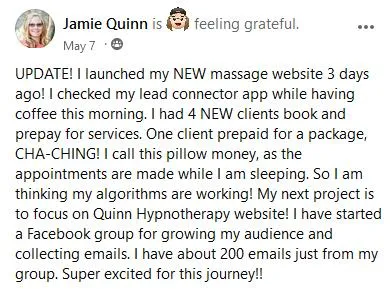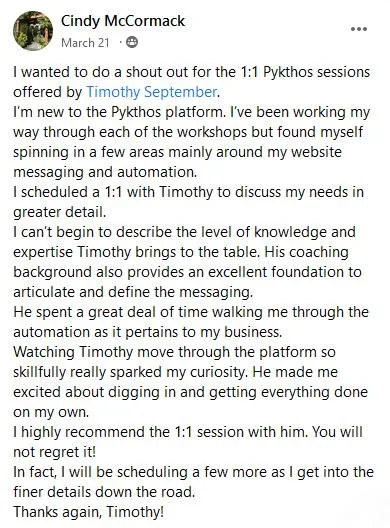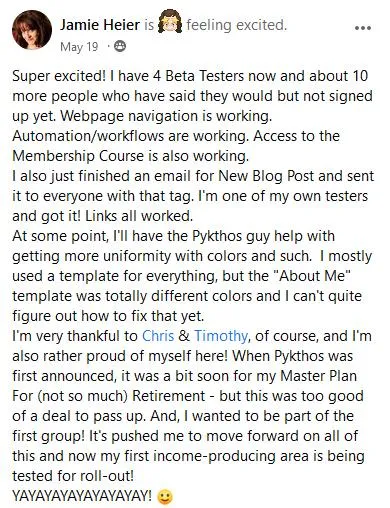Get your 7-Step framework to create a thriving business for FREE
Just fill out the form and we'll send it to you

Blogs

How to Build the Perfect Nurture Sequence From Scratch
How to Build the Perfect Nurture Sequence From Scratch
Wanna know a huge secret to growing your business?
First, think about this: Do most married couples get married the very first moment they set eyes on each other?
Of course not. But what about the first date? That’s ridiculous, right?
So why should we expect anything different in the hypnotherapy, counselling or coaching business?
Turning a prospect into a client takes time. With most clients, you have to digitally date them first. Build up some trust, and then they’ll do business with you if it’s a fit.
One excellent way to do this is with a long-term email nurture campaign. But let’s back up a moment.
If you’re like most of the people we work with, you’ve probably heard terms like “email nurture sequence” and thought, “I have no idea what that is … and honestly, I’m not even emailing my list at all.”
Let’s clear that up.
A nurture sequence is a series of simple emails that automatically go out to the people who join your list. It helps people get to know you, trust you, and understand how you can help them, without you manually following up every time someone signs up.
Here’s the critical point most people miss:
Yes, you should follow up with people right away when they opt in. If someone joins your list for a freebie, a webinar, a workshop, or a consult, they have raised their hand. That is the perfect time to follow up, deliver what you promised, and gently nudge them toward the next step or offer.
But remember what we said at the very top! Most people are not going to sign up to do business with you on the first date.
That is where the nurture sequence comes in. After you have completed your initial follow-up or promotion, you drop people into a long-term series of emails that keeps you top of mind. This sequence continues to educate, inspire, and build trust over time so when they are ready to move forward, you are the obvious choice.
Without this long-term system, here’s what usually happens:
You send the freebie or initial offer
Maybe you send a follow-up or two
Then… silence
Months later, when you try to re-engage, they barely remember who you are
A nurture sequence fills that gap. It is what keeps the conversation going without you constantly chasing or reinventing content.
And here’s the best part: you do not need to write it all upfront. You can build it over time using the exact emails you are already sending.

What a Nurture Sequence Actually Does
A good nurture sequence:
Reinforces your expertise and credibility
Helps people understand the value of your work
Builds connection and trust over time
Prepares people to say yes when the timing is right
It is the slow-cook process in your business, the thing that keeps your audience warm and engaged while you focus on serving clients, creating offers, or growing your reach.

Why Start With Broadcasts
Here’s the easiest way to get started:
Use your broadcast emails, the one-time emails you send to your list, as your test kitchen.
When you send broadcasts, you get real data on:
Which topics people care about
Which subject lines grab attention
Which stories or tips generate replies
Which calls to action actually work
Some emails will crush it. Others will flop. That is priceless information. Instead of guessing what belongs in a nurture sequence, you will know because you have already tested it live.

How to Build the Sequence Step by Step
Send Regular Broadcasts
Weekly is ideal, but twice a month works too. Focus on value, consistency, and relevance.Ask for Replies
This is critical. Use soft calls to action like, “Hit reply and tell me how you’re applying this,” or, “Have you ever struggled with this? Let me know.” Replies do more than improve engagement and deliverability; they tell you which emails are really landing.
Track Performance
Look at opens, clicks, and unsubscribes, but prioritize replies as your top signal.
Save the Winners
Create a folder or document where you store your best-performing emails. Pay attention to themes and tone.
Organize Into a Flow
Turn your best emails into a logical sequence. Example:
Email 1: A practical quick win or helpful tip they can apply today
Email 2: Address a common struggle or question you hear from clients
Email 3: Share a client success story or case study to show what is possible
Email 4: Personal insight, perspective shift, or myth-busting around your topic
Load Into Automation
Set these emails up to automatically send after your initial promo or freebie sequence wraps up. That way, nobody falls through the cracks. This part only sounds intimidating if you’ve never done it but it’s super simple and Pykthos can help.
Keep Improving
Keep sending broadcasts. When a new one hits, promote it into your nurture sequence.

Pro Tips for Success
Balance connection and promotion
You are not friend-zoning your list forever. Use your nurture sequence to educate and connect, but also to softly remind them what you offer. That way you’re selling without coming off as a sleazy used-car salesman.Be conversational
Polished, corporate-style emails usually get ignored. Keep it real and human. Write the way you’d write to a friend who needs your advice.Leverage what you already have
Old blogs, social posts, webinars, or workshop notes can all become nurture emails. Remember you can load all this stuff into an AI tool like ChatGPT and ask it to create email ideas for you.
Next Step: Build It With Less Stress
You do not have to build a six-month sequence overnight. You can layer it in as you go, using proven material and real feedback from your audience.
Inside the Pykthos Mastermind, we walk you through this process step by step and we give you the tools, templates, and support to actually make it happen without the tech overwhelm.
Check out the Pykthos Mastermind here
And if you missed Part 1 of this series on how to create endless email content even without a blog, read it here:
No Blog? No Problem: How to Create Email Content From What You Already Know
Start small. Stay consistent. Build momentum. That is how you create a nurture system that works while you sleep.

How to Build the Perfect Nurture Sequence From Scratch
How to Build the Perfect Nurture Sequence From Scratch
Wanna know a huge secret to growing your business?
First, think about this: Do most married couples get married the very first moment they set eyes on each other?
Of course not. But what about the first date? That’s ridiculous, right?
So why should we expect anything different in the hypnotherapy, counselling or coaching business?
Turning a prospect into a client takes time. With most clients, you have to digitally date them first. Build up some trust, and then they’ll do business with you if it’s a fit.
One excellent way to do this is with a long-term email nurture campaign. But let’s back up a moment.
If you’re like most of the people we work with, you’ve probably heard terms like “email nurture sequence” and thought, “I have no idea what that is … and honestly, I’m not even emailing my list at all.”
Let’s clear that up.
A nurture sequence is a series of simple emails that automatically go out to the people who join your list. It helps people get to know you, trust you, and understand how you can help them, without you manually following up every time someone signs up.
Here’s the critical point most people miss:
Yes, you should follow up with people right away when they opt in. If someone joins your list for a freebie, a webinar, a workshop, or a consult, they have raised their hand. That is the perfect time to follow up, deliver what you promised, and gently nudge them toward the next step or offer.
But remember what we said at the very top! Most people are not going to sign up to do business with you on the first date.
That is where the nurture sequence comes in. After you have completed your initial follow-up or promotion, you drop people into a long-term series of emails that keeps you top of mind. This sequence continues to educate, inspire, and build trust over time so when they are ready to move forward, you are the obvious choice.
Without this long-term system, here’s what usually happens:
You send the freebie or initial offer
Maybe you send a follow-up or two
Then… silence
Months later, when you try to re-engage, they barely remember who you are
A nurture sequence fills that gap. It is what keeps the conversation going without you constantly chasing or reinventing content.
And here’s the best part: you do not need to write it all upfront. You can build it over time using the exact emails you are already sending.

What a Nurture Sequence Actually Does
A good nurture sequence:
Reinforces your expertise and credibility
Helps people understand the value of your work
Builds connection and trust over time
Prepares people to say yes when the timing is right
It is the slow-cook process in your business, the thing that keeps your audience warm and engaged while you focus on serving clients, creating offers, or growing your reach.

Why Start With Broadcasts
Here’s the easiest way to get started:
Use your broadcast emails, the one-time emails you send to your list, as your test kitchen.
When you send broadcasts, you get real data on:
Which topics people care about
Which subject lines grab attention
Which stories or tips generate replies
Which calls to action actually work
Some emails will crush it. Others will flop. That is priceless information. Instead of guessing what belongs in a nurture sequence, you will know because you have already tested it live.

How to Build the Sequence Step by Step
Send Regular Broadcasts
Weekly is ideal, but twice a month works too. Focus on value, consistency, and relevance.Ask for Replies
This is critical. Use soft calls to action like, “Hit reply and tell me how you’re applying this,” or, “Have you ever struggled with this? Let me know.” Replies do more than improve engagement and deliverability; they tell you which emails are really landing.
Track Performance
Look at opens, clicks, and unsubscribes, but prioritize replies as your top signal.
Save the Winners
Create a folder or document where you store your best-performing emails. Pay attention to themes and tone.
Organize Into a Flow
Turn your best emails into a logical sequence. Example:
Email 1: A practical quick win or helpful tip they can apply today
Email 2: Address a common struggle or question you hear from clients
Email 3: Share a client success story or case study to show what is possible
Email 4: Personal insight, perspective shift, or myth-busting around your topic
Load Into Automation
Set these emails up to automatically send after your initial promo or freebie sequence wraps up. That way, nobody falls through the cracks. This part only sounds intimidating if you’ve never done it but it’s super simple and Pykthos can help.
Keep Improving
Keep sending broadcasts. When a new one hits, promote it into your nurture sequence.

Pro Tips for Success
Balance connection and promotion
You are not friend-zoning your list forever. Use your nurture sequence to educate and connect, but also to softly remind them what you offer. That way you’re selling without coming off as a sleazy used-car salesman.Be conversational
Polished, corporate-style emails usually get ignored. Keep it real and human. Write the way you’d write to a friend who needs your advice.Leverage what you already have
Old blogs, social posts, webinars, or workshop notes can all become nurture emails. Remember you can load all this stuff into an AI tool like ChatGPT and ask it to create email ideas for you.
Next Step: Build It With Less Stress
You do not have to build a six-month sequence overnight. You can layer it in as you go, using proven material and real feedback from your audience.
Inside the Pykthos Mastermind, we walk you through this process step by step and we give you the tools, templates, and support to actually make it happen without the tech overwhelm.
Check out the Pykthos Mastermind here
And if you missed Part 1 of this series on how to create endless email content even without a blog, read it here:
No Blog? No Problem: How to Create Email Content From What You Already Know
Start small. Stay consistent. Build momentum. That is how you create a nurture system that works while you sleep.

Media Mentions

Jamie Quinn


Cindy McCormack


Jamie Heier


COMPANY
CUSTOMER CARE
LEGAL
FOLLOW US
Copyright 2025. Pykthos. All Rights Reserved.

